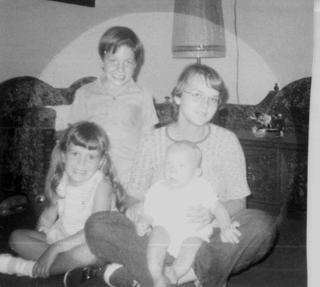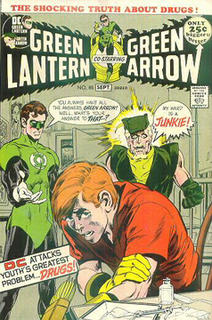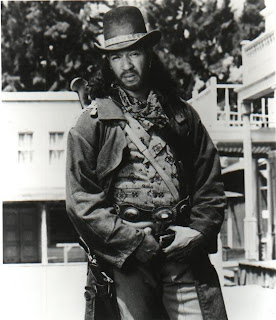Those of you who have been long time readers will have to forgive me once more for my annual "repeat" post. Today is a day that I often don't feel like posting about popular culture. Today is the eleventh anniversary of my mother's death, and I always feel a need to share on this day. I thought about writing something entirely original, but then I reread what I wrote in 2004 and it captures most of what I want to say. So instead of trying to reinvent the wheel, I will post the contents of a prior entry. Before you move on to the piece, I'd like to make two comments. I have added some sentences (I also updated my age and the length of time since my mom died), they are in italics, and my statement below that my mother will never get to meet her grandchildren has come true. My mom will never get to meet her lovely granddaughters Nora Thekla Lindke and Clio Millie Lindke. I don't often include photos of family on this blog, but I'll make a rare exception today.

Here are Nora and Clio. Do you see how much they look like their grandmother?

This is a picture of my mom in 1971, that blob on her lap is me.
Here is another picture of Nora and Clio. A Day to Listen to the Velvet Underground
A Day to Listen to the Velvet UndergroundI am only
38 years old, but today marks the end of my first
eleven years without a mom. That is an awkward sentence, but it best captures my sentiments. I am not an orphan, I still have a father. In fact,
I recently had a wonderful, but too short, visit with him and my sister last week. Yet a part of me is still very much missing, a large part. October 7th, 1998...10,7,98...those numbers loom large and ominous in my heart and this is the first year I am not completely overwhelmed by them.
My wife and I have intimate conversations often, it is one of the joys of marriage, and she and I were discussing death the other day. Her grandmother had just died at the age of 92. My wife explained it this way, "When someone dies, the world feels a little less complete. Bird songs aren't as joyful, and sunrises are slightly less beautiful." Displaying, as she often does, the magnificence of unedited, awkward, and spontaneous verbal poetry. She was also correct. C.S. Lewis opens his book A Grief Observed with another observation about death:
No one ever told me that grief felt so like fear. I am not afraid, but the sensation is like being afraid. The same fluttering in the stomach, the same restlessness, the yawning. I keep on swallowing.
I still feel this way, not everyday...today.
There are two things that are still difficult for me to do seven years after my mom died when I was 27 (she was 46).
I have a hard time remembering truly happy moments with her...on command. Happy moments enter my consciousness at random moments and seldom on the anniversary of her death. Glimpses of her nymph-like smile...brief auditory illusions of her laughter enter my mind. But the majority of my memories are neither happy nor sad, they are the memories of everyday activities, evening dinners and the question which ever looms over the head of a teenager, "Have you finished your homework?" I remember watching videotapes with her on many occasions, though none as awkward as the time we watched
The Hunger, just the two of us and an erotic vampire film. I remember feeling both uncomfortable being aroused by the film, in my mom's presence, while at the same time finding the situation hilarious. This moment just came to mind. There are many more like it, I just can't remember them on demand. In all honesty, I remember my mom as a happy person, a person who added joy to the world. Which is why I have my other difficulty.
I can't understand my mom's addiction, and eventual death due to how it ravaged her body, to heroin. I try, by reading/watching/listening to and about other addicts. I know the narrative of my mom's addictive cycle, I can see each step of her hopeless journey. That's not what I can't understand. I know the things that led to her addiction. What I can't understand is the overwhelming power of it, how addiction stole my mom from me...day by day. Oddly, some really shallow things help. They are a poor substitute for true knowledge, and seem trite when I think hard on them, but they help. These things include the music of the Velvet Underground (in particular, you guessed it, Heroin) and Iggy Pop, the films
Permanent Midnight (which I saw just after her death) and
Trainspotting, the book and film versions of
Razor's Edge, and the writings of C.S. Lewis among other things.
I am the only member of my immediate family I know of who attends church. I was raised secularly. Strange as it sounds my mom found comfort in, though she was baffled by, my belief. She once asked -- before I was a regular church attendee -- if I believed in God, expecting me (the first college student in my family) to laugh at the absurdity of the question. I told her I did and her response lingers with me to this day, "Really?" Her eyes looked at me...proud, confused, unbelieving, yet hopeful. I never was able to tell her that hope was what faith was all about ("Faith is the realization of what is hoped for and evidence of things not seen" Hebrews 11:1). It isn't about "knowledge," little of life is about actual knowledge. This is why the Oracle at Delphi asked us to know ourselves, that is a difficult enough task. Let alone the ability to acquire actual knowledge of something else.
I was notified of my mom's death by answering machine. I was in classes all day and didn't have a cell phone. A series of messages of an ever-worsening condition. Seizures...followed by emergency medical action.
The voices of my father and sister becoming more and more desperate as they couldn't reach me in person. My wife and I later read the medical records to piece together a time line, to see if there was an heroic effort to save my mom. There was. It is not the best way to be notified of death, answering machine, I think it is the worst. I also wish that my mom had been buried not cremated, I would have liked to have had the chance to speak, to say my own words.
A dear friend of mine died of cancer two-and-a-half years ago and her funeral approximated what I would have liked for my mom. There is a tangible closure in the physical act of burial. It is still a sad event, to be sure, but there is emotional power in the ritual. Instead, I will share the two poems I think best capture the way I feel. One is gender confused (for my situation not its own) and the other is written from an older generation to a younger one, but they will have to do. In addition I would like to add a part of Philip K. Dick's author's note from
A Scanner Darkly.
The first poem is by W.H. Auden (and yes it's the poem from
Four Weddings and a Funeral but the scene it is in is one of my favorites in all of cinema).
Stop all the clocks, cut off the telephone,
Prevent the dog from barking with a juicy bone,
Silence the pianos and with muffled drum
Bring out the coffin, let the mourners come.
Let aeroplanes circle moaning overhead
Scribbling on the sky the message He Is Dead,
Put crepe bows round the white necks of the public doves,
Let the traffic policemen wear black cotton gloves.
He was my North, my South, my East and West,
My working week and my Sunday rest,
My noon, my midnight, my talk, my song;
I thought that love would last for ever: I was wrong.
The stars are not wanted now: put out every one;
Pack up the moon and dismantle the sun;
Pour away the ocean and sweep up the wood.
For nothing now can ever come to any good.
The second poem is by Wordsworth:
SURPRISED by joy--impatient as the Wind
I turned to share the transport--Oh! with whom
But Thee, deep buried in the silent tomb,
That spot which no vicissitude can find?
Love, faithful love, recalled thee to my mind--
But how could I forget thee? Through what power,
Even for the least division of an hour,
Have I been so beguiled as to be blind
To my most grievous loss?--That thought's return
Was the worst pang that sorrow ever bore,
Save one, one only, when I stood forlorn,
Knowing my heart's best treasure was no more;
That neither present time, nor years unborn
Could to my sight that heavenly face restore.
Wordsworth wrote
Suprised by Joy (C.S. Lewis titled one of his autobiographies after this poem), for his daughter Catherine who had died at the age of four. This poem masterfully captures the grief I feel over the loss of my mom. Every time I have wonderful event in my life, I want to call her and share the news. That can never happen and it brings the event of her death immediately to mind and my sorrow and feeling of loss are renewed. Every time...without fail. My mom missed my graduation, my wife's master's, my acceptance to graduate school, my wife completing her MFA in film at USC. She will not be there to see her first grandchild, or any of the joy that her grandchildren will bring into the world.
As I stated before, I have continually looked to fiction and biographical narrative to understand my mom's addiction and that is why I am including the following by Philip K. Dick.
This has been a novel about some people who were punished entirely too much for what they did. They wanted to have a good time, but they were like children playing in the street; they could see one another of them being killed --run over, maimed, destroyed -- but they continued to play anyhow...
Drug misuse is not a disease, it is a decision, like the decision to step out in front of a moving care. You would call that not a disease but an error in judgment. When a bunch of people begin to do it, it is a social error, a life-style. In this particular life-style the motto is "Be happy now because tomorrow you are dying," but the dying begins almost at once, and the happiness is a memory..."Take the cash and let the credit go," as Villon said in 1460. But that is a mistake if the cash is a penny and the credit is a whole lifetime...
If there was any "sin" it was that these people wanted to keep on having a good time forever, and were punished for that, but, as I say, I feel that, if so, the punishment was far to great...
I don't entirely agree with P.K. Dick's statement above. Certainly I agree that "the punishment was far too great," but I disagree with his statement that "drug misuse is not a disease." I absolutely believe that an individual has some -- though not always complete -- control over the initial decision whether to use or not use a drug initially. Some people are self-diagnosing their psychological state and self-medicating to heal themselves, others are being "happy now because tomorrow they are dying."
It does not matter why a person first used drugs, whether for "happiness" or to feel normal, there is a point in the addict's life where the drug takes over. The addict's brain chemistry is altered and they begin to experience the disease that is addiction. I firmly believe that addiction is a disease. Drug use? Not necessarily, but addiction is. When you've seen addiction in one person, you begin to recognize it when you witness it elsewhere. It is an eerie phenomenon to see the addicted personality because no matter who the addict is, no matter what their personal pain or prior life, no matter that every person is unique, the addicted personality is strikingly familiar.

When my mom first told me of her addiction to heroin she expected me to be angry. A lot of my family was, I think the thought of my mother using heroin was too alien to them to even imagine. I think they viewed her use as somehow a failure on their part. I didn't, I only wanted to know if she was okay. By which I meant was she okay at the time she told me. My mom thought that heroin could make life more pleasant, for her it wasn't a selfish desire for more fun than anyone else was having, because she felt empty and sad on a regular basis. Heroin made her feel happy, like she could live life. But in making her think she could live life, heroin took life from her.
I don't "forgive" my mom for dying, I have never thought there was anything to forgive. I miss my mom and wish she were here. I love her and knowing that makes the missing part not so bad, because (as C.S. Lewis would say) the pain we feel now is a part of the love we have.












